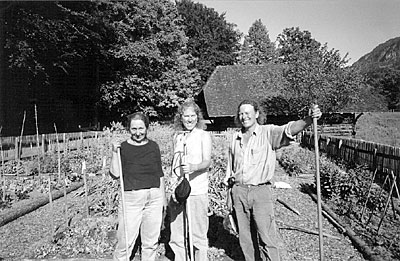 |
| Christine Zollinger (left), Terry Allan and Robert Zollinger pose at the Zollingers’ demonstration seed garden at the Ballenberg Building Museum in Switzerland. The Zollingers travel two to three hours to this garden every other week to help promote seed saving – and to take a break from their own seed farm. Terry Allan photo. |
by Terry Allan
When you take the ferry from Montreux to Le Bouveret, Switzerland, you see the mountains rising steeply and dramatically above the shores of Lake Geneva. Many are still snow capped in June. Then you notice a break in the heights where the mountains part and the Rhone River empties into the lake. Follow the river a mile or two into this deep valley and you come across more than a dozen hoop houses at the heart of the organic seed production farm of Robert and Christine Zollinger.
The Zollingers run their own seed catalog business, growing all of the seeds they sell, including 137 varieties of vegetables, 63 flowers, 22 herbs and 20 specialty items. Robert and Christine recognized the need to conserve and preserve traditional varieties of crops in the ’70s and started growing seeds, focusing on nonhybrid (and now of course, non-GMO) varieties of plants of economic importance traditionally cultivated in the Swiss alpine region. They select varieties with such confirmed horticultural value as exceptional taste and nutrition, subtle scent, unique color, ornamental and/or medicinal properties. They further select plants that are well adapted to the particular social, economic and ecological conditions in their region, and those that are adapted to organic growing practices.
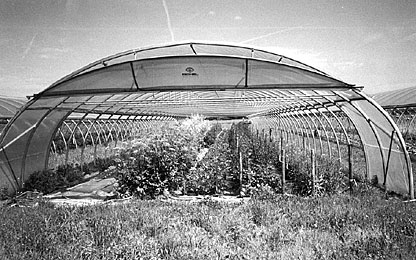 |
| Hoop houses have been one of the most important investments in the Zollingers’ seed farm. They extend the growing season and provide a place to dry seeds. Terry Allan photo. |
“We could see the way farming was being taken over by seed companies and corporate agribusiness even back then,” says Christine, “so we consciously committed ourselves to preserving the important traditional varieties from the very beginning. We looked for the varieties that the monks used and developed in the ancient monasteries in our region, and over the years we have been given special varieties by old gardeners who want us to keep them from disappearing.”
Production Starts with Good Soil
Looking around at the incredible scenery, one can think of a lot of reasons the Zollingers might have chosen to shift to this place, but Robert is always practical: “When we found this land 10 years ago, we were specifically looking for good soil.” The ancient river bottom soil convinced them to leave their original farm in the German speaking part of the country near their families and settle in this fairly remote, traditional, French-speaking corner of Switzerland. They are the only organic farmers in the region. “Sometimes we feel isolated,” says Robert, “but maybe we will influence some of the other farmers to change their practices.”
They started with 25 acres, and just last year bought an additional 25 acres from the neighboring farmer who retired. So now with a total of 50 acres, they feel they have enough land to do proper crop rotations, as well as enough area to achieve optimum isolation distances for maintaining seed variety purity.
The Zollingers work hard to maintain varietal purity and vigor through careful rouging and selection. Over the years they have developed their own strains of several varieties, which they indicate as “selection Z.” Crop planning for production of so many varieties is complex. They grow enough seed of each variety to last for a few years so that they don’t have to plant every variety every year. This allows them to grow and offer several varieties of the same species without risk of cross pollination.
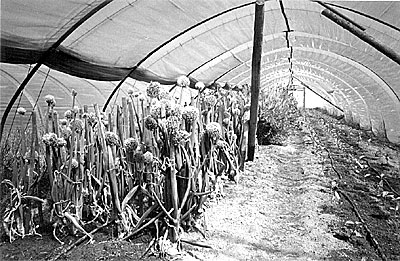 |
| An onion seed crop grows well in this hoop house. Terry Allan photo. |
Over the years they have invested in the equipment they need. They have four tractors and various implements for the farming side of the operation. For processing the seeds they have a seed cleaning table (a machine that vibrates seeds through different size screens to separate chaff and weed seeds from the desired seeds) and a seed packer, which automatically fills and seals the seed envelopes. This saves a lot of time and measures the seed more consistently. Both of these they found second hand.
Hoop Houses Temper Weather
But the most important investment was in their hoop houses. “We have great soil, but not perfect weather, so the hoop houses are essential.” They provide protection from wind and other weather extremes until the more fragile seeds are set and harvested. Biennial crops are field grown the first year, then dug, selected and transplanted into hoop houses to complete the seed production cycle. They can then overwinter safely in the hoop house and get an early start in the spring. Because the fall weather is not ideal for drying seeds, drying racks are set up in the hoop houses. So the houses get used throughout the year for different purposes.
The Zollingers have slowly and carefully expanded their business, intentionally keeping it small. “Growing and selling seeds lends itself well to being a family business,” says Christine. “During the summer we are busy growing, harvesting in the fall, making the catalogs before the New Year, and doing most of the shipping in the early spring.” Robert and Christine manage every part of their seed business themselves. They design and print their catalog and do all of the photography as well. Robert even designed most of their packaging, which includes a shipping box that cleverly folds into a seed packet holder and then converts to a storage box convenient for home gardeners.
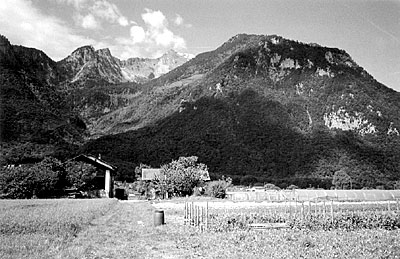 |
| The Zollingers’ house (left), barn, hoop houses and garden with some gorgeous Swiss scenery in the background. Terry Allan photo. |
Supporting Family and Friends
The business is a good size now for supporting their family. They have four sons, Tulipan, Tizian, Til and Falc. The boys are encouraged to follow their own dreams and inclinations, and Robert and Christine don’t know if any of their sons will carry on the business when they grow up. Tulipan, the oldest, is now 19 and is deciding which path to follow in pursuing his studies. Many of you may have met Tulipan at the MOFGA site or at Johnny’s Selected Seeds, where he interned two summers in a row.
During the summer they hire additional help, including two fulltime workers, an assortment of international interns, and occasional WWOOFers (World-Wide Opportunities on Organic Farms; see www.wwoof.org). Conversation around the lunch table with the family and workers may be in as many as five languages. One woman is a Serbian refugee who understands French; an intern from Poland understands some German; a WWOOFer from the UK speaks some Polish; their American visitor speaks English; and a volunteer is from the German part of Switzerland, creating a typical eclectic mix to which their boys have become accustomed.
They are pretty self-sufficient on the farm. A herd of sheep grazes rotationally to take care of mowing, as well as provide all of their meat, from smoked rashers such as bacon, to sausages, roasts and ground meat. Christine bakes bread one day a week from their own grain, and they grow fruits and vegetables that they preserve by canning or freezing. She buys only dairy products, pasta and occasionally some Swiss chocolate (of course) at the store in the village.
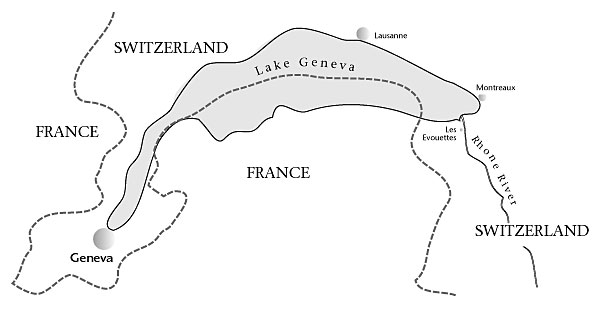 |
| Les Evouettes, home of Christine and Robert Zollinger, is located in the fertile Rhone River valley of Switzerland. Tim Nason map. |
Promoting Seed Saving
The Zollingers actively encourage other farmers and gardeners to save their own seeds, because such seeds will produce plants well adapted to the specific climate and growing conditions where they are produced. Robert says, “Twenty years of growing, maintaining and selecting these varieties in our region and under organic conditions is our warranty. Ultimately, the locally grown seeds are our best hope for successful farming in the long run.”
To educate people about seed saving, they invite their customers to visit their farm on specified “Open House” days published in their catalog, and they organize special tours and seed saving workshops upon request. They also participate in fairs, where they find a lot of enthusiasm for the old varieties. In addition, they have a demonstration seed growing garden at the Ballenberg Swiss Building Museum near Interlaken. Although it is a two- to three-hour drive from their farm, they regularly visit and tend this beautiful garden that connects the past with the present. “Actually, we really look forward to our biweekly trips there. Robert and I get a chance to get away from the management responsibilities of our farm and actually do some gardening together. It’s like a vacation.”
Robert is active in a group opposing GMOs, and they support an initiative for popular vote on a moratorium (see the Sept.-Nov. 2003 issue of The MOF&G ). Robert is opposed to hybrids, and now to GMOs, because “we simply don’t need them. All of the varieties we need for nutrition, taste, productivity and disease resistance are available or can be bred by farmers as open pollinated.”
You can contact the Zollingers at [email protected], or better yet, send a real letter (Falc collects stamps!) to: C. et R. Zollinger, Semences Biologiques, CH-1897 Les Evouettes, SWITZERLAND.
About the author: Terry Allan has extensive experience growing crops, from time spent in Africa in the Peace Corps to work at Johnny’s Selected Seeds. She is now establishing a medicinal herb garden for the survivors of the Union Carbide catastrophe in Bhopal. You can contact her at the Sambhavna Clinic, 44, Sant Kanwar Ram Nagar, Berasia Road, Bhopal, M.P. 462018, INDIA, or by email: [email protected].
